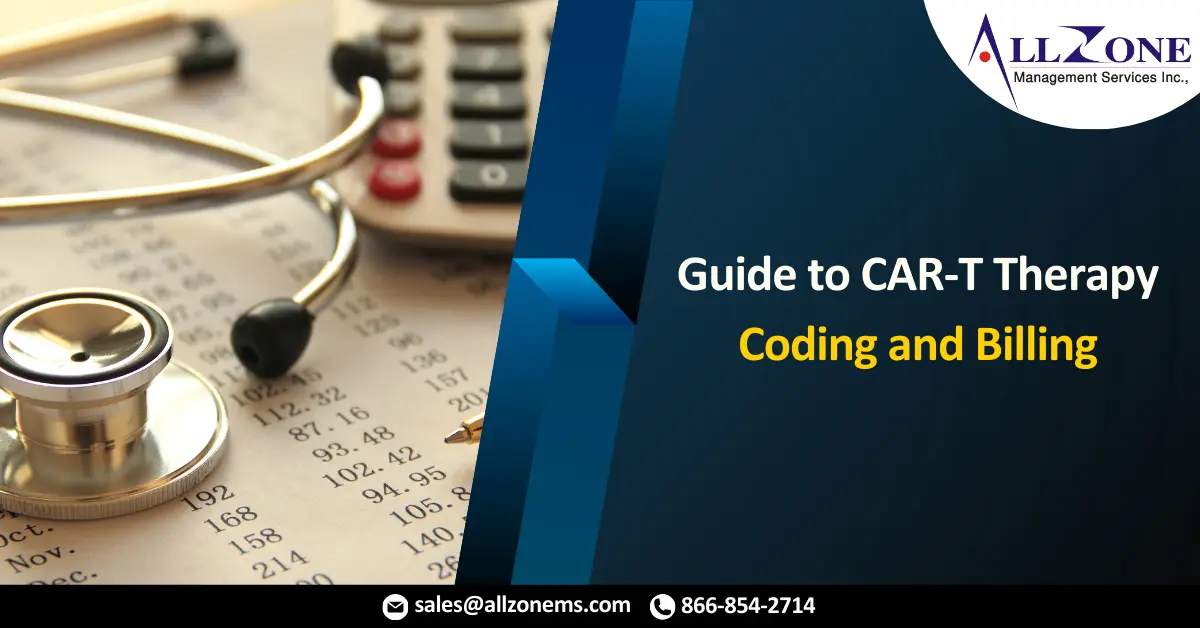Stay updated with the latest guidelines for reporting products and procedures related to Chimeric Antigen Receptor (CAR) T-cell therapy to ensure accurate CAR-T therapy coding and billing for Medicare patients.
Overview of CAR-T Therapy
CAR-T is a cutting-edge cell-based gene therapy that modifies a patient’s own T lymphocytes (T-cells) in a lab to express chimeric antigen receptors (CARs). These CARs enable T-cells to identify and target specific antigens on cancer cells. Once genetically engineered, the CAR T-cells are infused back into the patient, where they work to destroy cancer cells with the targeted antigen. Accurate CAR-T therapy coding is crucial for proper reimbursement, research, and clinical trial data analysis
Since the publication of my previous article, three additional biologics have received FDA approval, expanding the list of CAR T-cell therapies:
- Kymriah (tisagenlecleucel)
- Yescarta (axicabtagene ciloleucel)
- Tecartus (brexucabtagene autoleucel)
- Breyanzi (lisocabtagene maraleucel)
- Abecma (idecabtagene vicleucel)
Medicare continues to cover autologous CAR-T treatment for cancer when administered at FDA-enrolled healthcare facilities under medically accepted indications, either FDA-approved or supported by CMS-approved compendia.
Updates in CAR-T Coding and Billing
Outpatient Coding
Use these HCPCS Level II codes for outpatient billing:
- Yescarta (Q2041): Up to 200 million anti-CD19 CAR T-cells
- Kymriah (Q2042): Up to 600 million CAR-positive viable T-cells
- Tecartus (Q2053): Up to 200 million autologous anti-CD19 CAR-positive viable T-cells
- Breyanzi (C9076): Up to 110 million autologous anti-CD19 CAR-positive viable T-cells
- Abecma: Use C9399 for billing until a specific code is assigned.
For outpatient CAR-T services, use the following CPT® codes:
- 0537T: Chimeric antigen receptor T-cell (CAR-T) therapy; harvesting of blood-derived T lymphocytes for development of genetically modified autologous CAR-T cells, per day.
- 0538T: Chimeric antigen receptor T-cell (CAR-T) therapy; preparation of blood-derived T lymphocytes for transportation (e.g., cryopreservation, storage).
- 0539T: Chimeric antigen receptor T-cell (CAR-T) therapy; receipt and preparation of CAR-T cells for administration .
- 0540T: Chimeric antigen receptor T-cell (CAR-T) therapy; CAR-T cell administration, autologous.
Inpatient Coding
For inpatient CAR T-cell therapy, use these ICD-10-PCS codes:
- XW033C3 / XW043C3: Administration of engineered autologous CAR-T therapies (Yescarta, Kymriah, Abecma).
- XW23346 / XW24346: Transfusion of Tecartus.
- XW23376 / XW24376: Transfusion of Breyanzi.
Revenue and ICD-10-CM Codes
Report services using the appropriate revenue codes:
- 0871: Cell Collection
- 0872: Specialized Biologic Processing and Storage – Prior to Transport
- 0873: Storage and Processing after Receipt of Cells from Manufacturer
- 0874: Infusion of Modified Cells
- 0891: Special Processed Drugs – FDA Approved Cell Therapy
ICD-10-CM diagnosis codes include:
- Tecartus: Mantle cell lymphoma (C83.11–C83.19)
- Yescarta & Kymriah: Diffuse large B-cell lymphoma, other non-Hodgkin lymphoma types, and acute lymphoblastic leukemia (C91.00, C91.02).
- Breyanzi: Follicular lymphoma grade IIIb (C82.41–C82.49).
- Abecma: Multiple myeloma (C90.00, C90.02).
CAR-T Therapy Coding Services in Healthcare
CAR-T (Chimeric Antigen Receptor T-cell) therapy represents a groundbreaking advancement in cancer treatment, offering a personalized approach by modifying a patient’s T-cells to target cancer cells. However, the complexities of CAR-T therapy coding require precise expertise to ensure proper reimbursement and compliance with evolving regulatory standards.
CAR-T therapy involves unique coding challenges due to its intricate processes, including T-cell collection, laboratory modification, and reinfusion into the patient. These steps necessitate accurate assignment of CPT, ICD-10, and HCPCS Level II codes to reflect the specific services provided. Recent updates, such as the addition of HCPCS code C9076, highlight the importance of staying informed about code changes to ensure accurate billing.
Professional CAR-T therapy coding services streamline this process by utilizing certified coders trained in oncology and cellular therapy procedures. By adhering to payer guidelines and documentation requirements, these services minimize claim denials, enhance revenue cycle efficiency, and reduce administrative burdens for healthcare providers.
Outsourcing CAR-T therapy coding ensures compliance with payer policies, maximizes reimbursement, and allows providers to focus on delivering innovative care. Partner with a trusted medical coding company to navigate the complexities of CAR-T coding and support financial stability in your healthcare practice.

